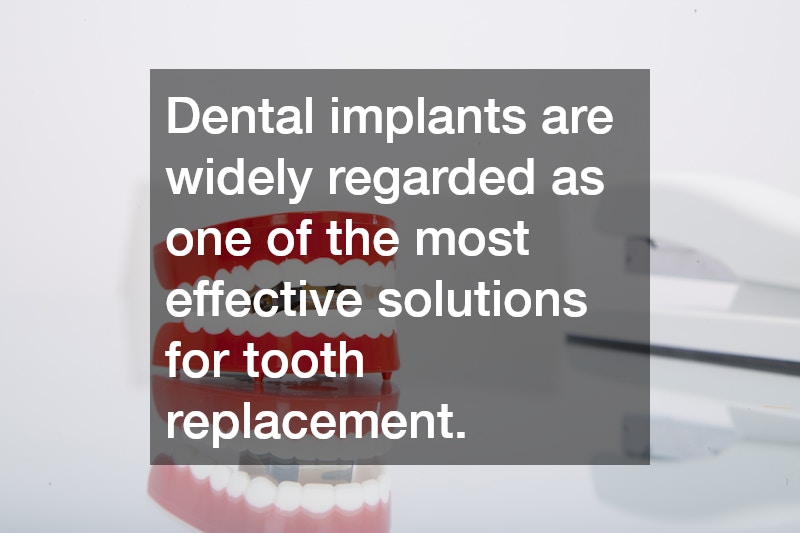Teeth Replacement Options: Which Solution Is Right for You?
Explore the various teeth replacement options available today, helping you choose the solution that best suits your dental needs and lifestyle. The process of finding the right teeth replacement can be daunting, given the numerous considerations that need to be taken into account. Understanding the benefits and limitations of each option is crucial for making an informed decision that enhances not only your smile but also your overall health and quality of life.
Modern dentistry offers several realistic solutions to help individuals regain confidence and functionality. From traditional methods to innovative advancements, the range of options caters to diverse needs, ensuring that everyone can find a suitable match. Whether you’re dealing with a single missing tooth or total tooth loss, there’s a replacement strategy designed to replicate the look, feel, and function of natural teeth.
As you navigate through this guide, you will discover the unique attributes of each teeth replacement option. We shall delve into their benefits, processes, and longevity, providing a comprehensive understanding to facilitate your decision-making. Additionally, personal testimonials and experiences will shed light on real-life implications, aiding you in visualizing the outcomes you desire.
What are the most common teeth replacement options?
Dental Implants
Dental implants are widely regarded as one of the most effective solutions for tooth replacement. They are surgically placed into the jawbone, where they act as a strong foundation for artificial teeth. A significant benefit of dental implants is their durability; with proper care, they can last a lifetime. Furthermore, this option helps preserve jawbone health, as the implants integrate with the bone, preventing the deterioration that often follows tooth loss.
The procedure for dental implants involves several stages, including initial consultations, surgical placement, healing periods, and eventual attachment of the prosthetic tooth. While the process may require several months to complete, the outcome is typically a permanent and highly reliable tooth replacement. Patients often report improved confidence and comfort compared to other solutions, thanks to the implants’ natural feel and stability.
Longevity is a hallmark of dental implants, with success rates reported to be as high as 95%. The maintenance for dental implants aligns closely with standard oral hygiene practices, involving regular brushing and flossing. However, it is essential to follow specific dental care instructions provided by professionals to avoid complications such as infections or implant failure.
Dental Bridges
Dental bridges are another popular choice for replacing missing teeth, particularly for individuals who prefer a non-invasive option. Bridges work by anchoring artificial teeth to adjacent natural teeth or implants, effectively “bridging” the gap created by one or more missing teeth. This method restores functionality and appearance, allowing for normal biting and speaking capabilities.
There are various types of dental bridges, including traditional, cantilever, Maryland, and implant-supported bridges. Each comes with specific features catering to different dental conditions and preferences. A traditional bridge, for instance, uses crowns on adjacent teeth as anchors, whereas an implant-supported bridge is secured directly onto dental implants without affecting neighboring teeth.
The procedure for getting a dental bridge involves preparing the adjacent teeth, creating impressions, and fitting a custom-made bridge. Despite not being as long-lasting as implants, bridges can offer a life span of 5 to 15 years with good care. Regular dental visits are crucial for ensuring the continued health and alignment of the bridge, along with maintaining proper oral hygiene to prevent decay in surrounding teeth.
Complete and Partial Dentures
Dentures provide a versatile and non-invasive solution for teeth replacement, suitable for those who have lost several or all their teeth. Complete dentures are used when no natural teeth remain, while partial dentures fill in gaps where some natural teeth are still present. These custom-made appliances rest on the gums and are removable, providing ease and flexibility for the wearer.
The process of obtaining dentures involves several appointments, including dental impressions and fittings, to achieve a comfortable and functional result. Technological advances have greatly enhanced the aesthetics of dentures, allowing them to closely resemble natural teeth and gums. Despite being less permanent than implants or bridges, dentures remain a cost-effective and widely accessible option.
The primary difference between complete and partial dentures lies in their structure; partial dentures typically have a metal framework that clasps onto the remaining natural teeth. Maintenance for dentures requires daily cleaning and soaking to prevent bacterial buildup. It’s also important to schedule regular dental check-ups to ensure the proper fit and function of the dentures, as the shape of gums and underlying bone can change over time.
How do I choose the best teeth replacement option for me?
Consulting with a Dental Professional
The journey to choosing the right teeth replacement starts with consulting a dental professional. Their expertise and experience are invaluable in evaluating your oral health condition and recommending the most appropriate solution. Dentists assess factors such as bone density, gum health, and the number of teeth that need replacing, providing a tailored approach to your needs.
A thorough consultation includes discussing your medical history, lifestyle habits, and any concerns you have about the procedure. The dentist will explain the pros and cons of each option, helping you weigh them against your priorities and expectations. This professional guidance is crucial in setting realistic outcomes and equipping you with the necessary information to make an informed choice.
Regular follow-up appointments and continuous dialogue with your dental care team ensure that your teeth replacement journey progresses smoothly. Should any adjustments be needed, your dental professional is there to provide support and recalibrate your treatment plan. This collaboration fosters a relationship of trust and competence, essential for your long-term oral health and success in tooth replacement.
Evaluating Cost and Insurance Considerations
Financial considerations play a significant role in choosing the right teeth replacement option. Costs can vary widely depending on the procedure complexity, materials used, and geographical location. Dental implants, for example, tend to be the most expensive due to their surgical nature and long-lasting results, whereas dentures typically offer a more affordable option.
Insurance coverage can significantly impact the expenses incurred during teeth replacement. It’s crucial to thoroughly review your dental insurance policy to understand what is covered and any out-of-pocket costs you may face. Some insurance plans cover a portion of the costs for bridges and dentures but may offer limited coverage for implants, depending on the individual policy details.
Exploring financing options with your dental provider can ease the financial burden, as many offer payment plans to distribute the cost over time. When evaluating your options, consider not only the upfront cost but also ongoing maintenance expenses, as this will give you a clearer perspective of the total financial commitment. Balancing cost with the desired outcome will guide you toward an option that aligns with your financial capabilities and expectations.
Considering Personal Lifestyle and Preferences
Your personal lifestyle and preferences play an integral role in choosing a teeth replacement solution that suits you. Factors such as dietary habits, aesthetic preferences, and commitment to oral hygiene can influence your decision. For instance, individuals who seek a permanent solution with minimal daily maintenance might prefer dental implants over removable dentures.
Consideration of your daily routine is also essential. Dentures, while cost-effective, may require certain dietary adjustments to prevent damage or discomfort, whereas bridges and implants generally allow for a more “normal” eating experience. Additionally, your comfort with the idea of a fixed versus removable replacement option can guide your choice, as this can impact your confidence and ease of use.
Preference in aesthetics, such as the look and feel of the replacement teeth, is another significant consideration. Many people aim for a natural appearance that integrates seamlessly with existing teeth, while others may prioritize functionality over appearance. Discussing these preferences with your dentist can help align your options with your lifestyle, ensuring a personalized and satisfactory outcome.
What are the expected outcomes and maintenance requirements?
Long-term Success and Complications
The expected outcomes of teeth replacement vary depending on the type chosen, but successful integration and functionality should be the goal in all cases. Dental implants boast the highest success rate, with their ability to mimic natural teeth making them a popular choice. They help maintain jawbone structure and offer a lasting solution without the need for adhesives or special cleaning solutions.
However, it is important to acknowledge potential complications, such as infection, nerve damage, or implant failure, which, though rare, can occur. Bridges, while effective, require healthy adjacent teeth for support, posing a risk of decay or damage to those teeth over time. Dentures, on the other hand, may cause gum irritation and require regular adjustments to accommodate changes in mouth shape.
Awareness and management of these risks contribute to the long-term success of your chosen teeth replacement. Regular dental check-ups and adhering to prescribed aftercare practices are essential in preventing issues that can compromise function or appearance. In doing so, you ensure that your investment in oral health yields durable and satisfactory results.
Routine Maintenance and Hygiene Practices
Maintaining the longevity and functionality of your teeth replacement involves consistent care and hygiene practices. For dental implants, this means maintaining good oral hygiene through regular brushing, flossing, and routine dental visits. Special care around the implant area is necessary to prevent plaque build-up and ensure the health of the surrounding tissues.
For those with dental bridges, it’s crucial to clean under the false tooth daily to avoid gum disease and decay in the supporting teeth. Flossing tools and interdental brushes can help clean hard-to-reach areas effectively. Additionally, attending periodic dental evaluations allows for adjustments and the monitoring of bridge integrity.
Denture wearers need to soak their appliances daily and use a specialized denture cleaner to remove debris and bacteria. It’s equally important to brush the gums, tongue, and any remaining teeth to maintain oral health. These steps, along with routine dental check-ups, ensure your dentures fit well and function properly over time.
Real-life Patient Experiences
Real-life patient testimonials provide invaluable insight into the everyday outcomes and satisfaction levels associated with various teeth replacement options. Many dental implant recipients report a renewed sense of confidence and freedom, appreciating the permanence and natural feel offered by their replacement teeth. They enjoy the ability to consume a wider variety of foods and benefit from improved speech clarity.
Patients with dental bridges often express satisfaction with their improved aesthetics and seamless transition back to normal eating habits. The fixed nature of bridges provides them with a reliable solution that complements their natural teeth, although some note the importance of strict adherence to cleaning routines to avoid decay in the supporting teeth.
Denture users share diverse experiences, highlighting the importance of proper fitting and adaptation over time. Some appreciate the economic aspect of dentures and welcome the non-invasive nature of this option. However, they also emphasize the necessity of regular adjustments for comfort and the importance of overcoming initial speech and dietary adaptations.
Conclusion
In summary, the exploration of teeth replacement options reveals a spectrum of solutions tailored to diverse dental needs and lifestyles. From the robust permanence of dental implants to the adaptability of dentures, each choice presents distinct advantages and considerations. Emphasize the importance of consulting with dental professionals, as their expertise guides you through this crucial decision-making process. Ultimately, the right choice aligns with your specific needs, lifestyle, and expectations, ensuring optimal results and enhanced oral health in the long term.



